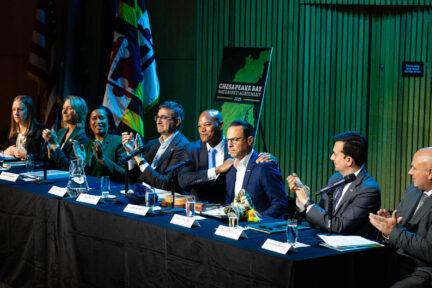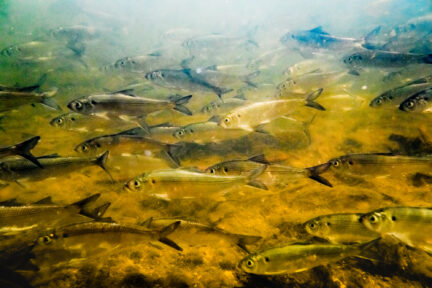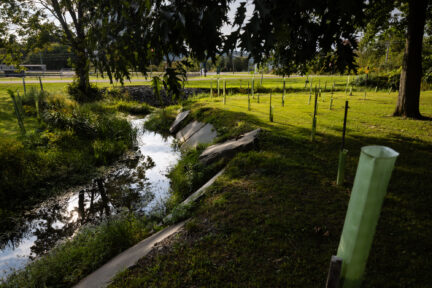Groundbreaking survey reveals extent of stewardship actions and attitudes in Chesapeake Bay region
The Chesapeake Bay Program released today the groundbreaking results of the first comprehensive survey of stewardship actions and attitudes in the Chesapeake Bay watershed.
The Chesapeake Bay Program released today the groundbreaking results of the first comprehensive survey of stewardship actions and attitudes in the Chesapeake Bay watershed. Known as the Citizen Stewardship Index, this powerful package of data and information reveals which actions residents are taking to protect clean water and restore environmental health, as well as showing how much of the region has volunteered or spoken out on behalf of the environment. The data also forecasts future stewardship by measuring residents’ willingness to engage in certain actions and responses to perceptions that motivate environmentally responsible behaviors.
Rooted in social science, the Citizen Stewardship Index will directly inform the work of watershed organizations and government agencies that foster environmental stewardship. By highlighting gaps in stewardship behavior, for instance, it can empower these agencies and organizations to more effectively design stewardship programs. By measuring the prevalence of citizen stewardship actions and attitudes, it helps the Chesapeake Bay Program track its Chesapeake Bay Watershed Agreement commitment to increase the number and diversity of volunteers with the knowledge and skills needed to enhance the health of their local watersheds.
When surveyed earlier this year, watershed residents scored a 24 out of 100 on the Citizen Stewardship Index. This score is based on the adoption rate of 19 actions that individuals can take to improve water quality and environmental health, as well as the portion of the public that is volunteering in community efforts to improve the environment and engaging in civic activities on behalf of the environment. To score a 100 on the Citizen Stewardship Index, everyone in the region would need to do everything they could in their daily lives to improve water quality and environmental health, from personal actions to volunteering and advocating for the environment. More information about how this score was determined is available at www.chesapeakeprogress.com/engaged-communities/citizen-stewardship.
In addition to the Citizen Stewardship Index—which describes the status of citizen stewardship—the survey results use three additional scores to predict future stewardship. The closer each score is to 100, the more individuals are likely to take actions in the near future to improve water quality and environmental health.
- The Likely to Take Personal Actions score—which is currently 22—measures residents’ willingness to consider taking an environmentally responsible action they are not taking today.
- The Likely to Volunteer and Advocate score—which is currently 63—measures residents’ interest in participating in community efforts or civic activities to improve water quality and environmental health.
- The Motivating Attitudes score—which is currently 65—measures five key perceptions that can motivate environmentally responsible behavior.
Facts
The data that informs the Citizen Stewardship Index was collected through English- and Spanish-language landline and mobile phone interviews with 5,200 randomly selected residents between March and May of 2017. In order to reveal specific findings about different segments of the region’s populations, this data can be downloaded, segmented and extrapolated by geographic region, demographic and socioeconomic characteristics, community attributes, behaviors and attitudes. It also has revealed six high-level findings about watershed residents as a whole.
- Some actions that have a significant impact on clean water—like using a rain barrel or rain garden to collect rainwater—have not been adopted to their fullest potential.
- Several actions with low adoption rates have a significant likelihood of becoming more common. For example, while only 41 percent of residents pick up other people’s litter when they see it, more than
- 50 percent of the residents who have not taken this action consider themselves likely to do so. Actions like this one could serve as focal points for agencies and organizations working to expand environmental stewardship.
- About one-third of residents have volunteered their time or donated their money to a charitable organization, but less than one in ten residents have done so for an organization that works to protect and restore clean water or environmental health.
- While a small percentage of watershed residents are civically engaged on behalf of the environment, this engagement has the potential to expand: 43 percent of residents could see themselves attending meetings or publicly speaking out in support of clean water.
- Most watershed residents believe strong federal and state action is needed to help clean up the Chesapeake Bay.
- Most residents want to improve the environment around them, but many don’t see themselves as part of the problem. This suggests organizations advancing environmental stewardship should emphasize the power of personal action and community engagement in cleaning up local waters feeding into the Chesapeake Bay in order to capitalize on the individual motivation that exists.
More information about these findings is available at www.chesapeakeprogress.com/engagedcommunities/citizen-stewardship.
Issues
Most watershed residents want to do more to make their local creeks, rivers and lakes healthier, but many don’t know how to support this work. Sixteen percent of watershed residents aren’t aware of actions they can take to reduce water pollution where they live and 51 percent do not believe their actions contribute to local water pollution. Furthermore, fewer than one in ten residents have volunteered their time for an environmental organization. This gap in environment-focused volunteerism could be caused by a gap in understanding how to help: 68 percent of residents could not think of a group in their community working to protect or restore local waters and 41 percent did not believe they would know how to volunteer to help their local environment if they wanted to. However, 71 percent of residents want to do more to make their creeks, rivers and lakes healthier, and 86 percent believe that if people work together, water pollution can be fixed.
Importance
The long-term success of our work to protect and restore the Chesapeake Bay will depend on the support of the people who call this watershed home. As more individuals and organizations direct their time, talents and resources toward reducing pollution, restoring streams and protecting the environment, we will build a larger, broader and more diverse community of citizen stewards to support our conservation goals. The Citizen Stewardship Index helps us understand what watershed residents are doing and would be willing to do to protect and restore clean water, and is a critical part of measuring the impact and tracking the progress of citizen stewardship programs. It empowers those agencies and organizations that foster behavior change to more effectively craft campaigns for best management practice adoption and helps funders prioritize their investments in citizen-led action.
A web-based tool that would allow watershed organizations and government agencies to scale and segment the Citizen Stewardship Index data and create custom reports will be developed over the next two years.
Quotes
"As a Coalition of over 240 nonprofit organizations across the watershed, the Stewardship Index is going to change the way our members think about and approach public engagement. This data will support our member’s efforts to change behaviors that negatively impact the health of our local waterways and the Chesapeake Bay."
- Chanté Coleman, Director, Choose Clean Water Coalition
"Many of our daily activities have the potential to directly impact our local water quality, so we all can play a role in protecting and improving our waterways and the Chesapeake Bay. This index gives us data to work from as we continue efforts to inform citizens about how to participate in being part of the solution to our watershed challenges."
- Lauren Imgrund, Deputy Secretary for Conservation and Technical Services, Pennsylvania Department of Conservation and Natural Resources, and Vice-Chair, Fostering Chesapeake Stewardship Goal Implementation Team
"The new Stewardship Index will provide citizens with a more direct understanding of how their actions both impact and benefit the Chesapeake Bay. Citizens want to do their part in restoring and protecting their local waterways and the Bay, and this new metric helps them gauge how much they’ve done, and how far there is to go."
- Paula Jasinski, Chair, Chesapeake Bay Program Citizens Advisory Committee
"From cleaning up after our pets, to installing rain barrels or rain gardens on our properties, to keeping litter out of streams, we all have a role to play in meeting our clean water goals for the Anacostia and Potomac rivers, Rock Creek and the Chesapeake Bay. The Chesapeake Bay Program’s new Stewardship Index is an important tool that will enable more targeted outreach and engagement, as we all work to ensure our waterways are fishable and swimmable for generations to come."
- Tommy Wells, Director, District of Columbia Department of Energy and the Environment
"The Stewardship Index is the first effort of its kind in the Chesapeake region, and has the potential to greatly advance how we as a community design and support outreach and behavior change projects. With new information from the Stewardship Index, we will be able to maximize the efficiency of outreach and community engagement programs regionally."
- Kacey Wetzel, Director of Programs for Outreach and Education, Chesapeake Bay Trust, and Chair, Chesapeake Bay Program’s Citizen Stewardship Workgroup
"The Alliance is focused on delivering on the ground projects in partnership with local communities—this Stewardship Index enables us to be better informed in how and where we prioritize our work. It is important that our decisions be based on data to ensure the best expenditure of public funds to provide for the greater benefit of increasing water quality, and quality of life, across the Chesapeake Bay watershed."
- Kate Fritz, Executive Director, Alliance for the Chesapeake Bay
Supporting Materials
- Environmental Stewardship in Washington, D.C.
- Environmental Stewardship in Delaware
- Environmental Stewardship in Virginia
- Environmental Stewardship in West Virginia
- Environmental Stewardship in Maryland
- Environmental Stewardship in New York
- Environmental Stewardship in Pennsylvania
- ChesapeakeProgress: Stewardship Outcome



